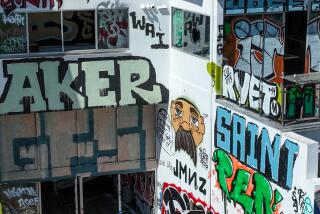Editorial: In its effort to go green, L.A. created a trash monopoly that’s gouging customers. They need to fix it
- Share via
The city’s new environment-friendly, years-in-the-planning garbage pickup program has left the Los Angeles businesses and condo associations that rely on it with a severe case of sticker shock.
Back in 2014, when the City Council and Mayor Eric Garcetti approved the program, there was a lot of talk about the environmental benefits of the program — which are real — but little mention by city leaders that the service would cost more.
The initiative, called recycLA, switched multi-family residential buildings, restaurants, factories and other businesses from the open market, in which they could negotiate with the garbage company of their choice, to an exclusive franchise system, in which the city selects one trash hauler for that area, sets the rates and regulates the service. The city, for example, requires all the participating companies to provide recycling bins and to drive cleaner trucks.
Single-family homes and small apartment complexes are served by the city’s Bureau of Sanitation and are not affected by the change.
It’s time for city leaders to be straight with Angelenos about the costs of being more environmentally responsible with our waste.
Now recycLA customers are getting bills for the new city-controlled service, and many are finding the price of trash pickup has increased significantly. Some customers report their bills have doubled or even tripled compared to what they paid before. There have been complaints of missed pickups and scheduling problems.
The waste haulers are also allowed to impose lots of new city-sanctioned fees, including charges if the truck driver has to unlock a gate, if the hauler has to move the trash bins more than 100 feet during pickup and if the container is so full that the lid doesn’t completely close.
Under the old system, customers who felt they were getting nickel-and-dimed by their trash company could take their business elsewhere. Now? Their only recourse is to complain to the company or the city and hope for some response.
It didn’t have to be this way. When L.A. leaders were debating how to reform the city’s trash system to meet increasingly strict recycling and clean vehicle mandates, they were presented with another choice. The option pushed by business groups and some city leaders was a non-exclusive franchise system. The city would set rules for trash companies operating in L.A., such as mandatory recycling and cleaner trash trucks, but still allow customers to choose from the pool of approved haulers. The non-exclusive system would have preserved the competition that helped keep prices low and service levels high.
Instead, labor and environmental groups convinced the City Council and mayor to create the exclusive franchise system. The city was divided into 11 zones, each with a single company awarded the contract to serve all customers in the zone. The groups argued that by creating little trash monopolies, the city could set more aggressive requirements, including stricter recycling targets and higher wage mandates.
Certainly Los Angeles needs to seriously step up its recycling program. California set a statewide recycling goal of 75% by 2020. Multi-family residences and businesses recycled a paltry 19% of their waste under the old system. In addition, the state requires businesses to divert from landfills food and organic waste, which is a major source of climate warming greenhouse gases, but the infrastructure or services to turn food scraps into compost or energy aren’t yet in Los Angeles.
RecycLA will help. The program requires haulers to cut landfill waste by 1 million tons a year. In addition to providing recycling bins, they must offer green waste bins and help customers donate edible food, furniture and other reusable items. They have to pay their workers at least the city’s living wage, which is currently $12.73 an hour, and put newer, cleaner trucks on the road. They also have to pay a franchise fee to the city, which will generate about $35 million a year. (No wonder City Hall likes the program.)
City officials say that customers can reduce their trash bills by recycling more. But there is no escaping the fact that more labor-intensive service and more diversion mandates will make trash pickup more expensive in Los Angeles. It’s time for city leaders to be straight with Angelenos about the costs of being more environmentally responsible with our waste. There’s also the reality that the lack of competition in the exclusive franchise areas leaves customers vulnerable to being gouged. The city created these monopolies, and now it has a responsibility to police them.
Follow the Opinion section on Twitter @latimesopinion and Facebook.
More to Read
A cure for the common opinion
Get thought-provoking perspectives with our weekly newsletter.
You may occasionally receive promotional content from the Los Angeles Times.










